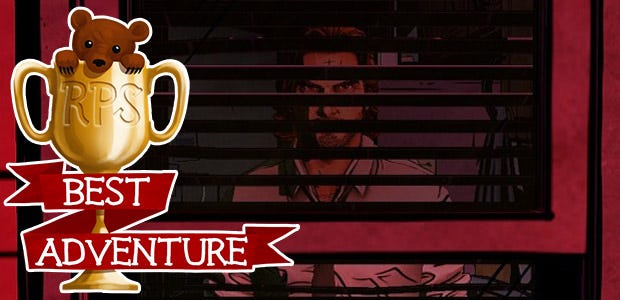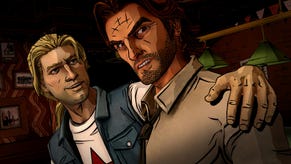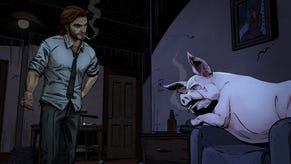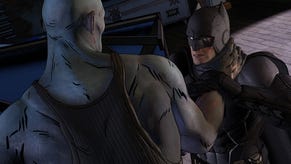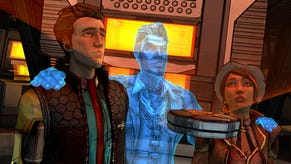The greatest adventure game of 2014: The Wolf Among Us
Big Good Wolf
Adventure games have been experiencing a resurgence this past year, but our favourite was by a developer that's hit a creative peak of their own after grinding away at the genre persistently for years. It's The Wolf Among Us.
Adam: Wolf-a-Mongoose, as my computer just autocorrected, pips a couple of other contenders to the post in this category thanks to its new-noir style. If the quality of Tales From the Borderlands keeps up after a surprisingly strong start, it might be Telltale's best series since the first Walking Dead, but in the battle of Clem and Bigby, the wolf is king.
Despite reservations as to the longevity of the formula, I think Telltale have been producing solid episodic entertainment consistently and with enough variation in theme and character to remain interesting for a while longer. Is anyone in gaming making better use of licensed properties? The Lego games perhaps but their template makes even less distinction between one setting and the next.
Whenever I write about Telltale, my mind wanders to other fictions that I'd like to see them tackle. Dr Who is a perpetual favourite in comment sections and it'd be a good fit, and I've expressed my desire for a Poirot adventure series several times. But it's the unexpected license that has impressed most this year. Borderlands could have been a cringeworthy collection of gags and characters zanier than Billy Zane's family reunions, but instead it saw Telltale returning to comedy with assurance, and escaping the cruel and increasingly predictable shocks of The Walking Dead.
With their Fables adaptation they explored new ground, squeezing a gorgeous neon-saturated noir out of Bill Willingham's fairy tales of New York. The detective work loses its way before the finale but the characters and dialogue are convincingly crafted caricatures and there's an enjoyable liveliness in the weaving of folklore across the loom of a grim noir mystery.
The art and writing are Wolfamongous' teeth and claws - the thick lines and exaggerated expressions find a good match in the gloom and glamours of the city, and the action sequences are weighty, pushing plot and characters forward rather than simply filling time.
There's a distinct lack of actual puzzles but that's the Telltale way now. These are interactive dramas, requiring a player to define the specifics of their protagonists' characters and offering scenes and situations to unpick. As a purist's adventure, the brilliant conclusion to the Blackwell series was probably the high point of the year, but as an example of Telltale's willingness and ability to pursue fresh narrative genres and settings, these new Fables are a treat.
As is often the case with episodic television, there are occasional dips in quality across Telltale's work, often depending on a specific episode's writer's treatment of the characters and setting - as an example, Pierre Shorette's work here is far superior to his writing on the weak middle section of Walking Dead season two - but the studio's strengths are usually enough to plaster over the flaws.
With The Wolf Among Us, the art team are at the heart of the success, along with Jared Emerson-Johnson, whose musical contributions were hugely important to The Walking Dead's most effective moments. While I'd like to have more agency within it, it carved a place in my memory and, despite Its Grimm and gruesome qualities, showed that Telltale aren't entirely dedicated to the misery mine of zombie land.
Graham: Masq is one of my favourite games precisely because it's an adventure game without any of the 'adventure' bits. No puzzles, no inventory, just dialogue, hard choices and exciting consequences. Telltale's previous series, The Walking Dead, seemed so close to reaching that, but was hindered by occasionally forcing the player to find an item or complete an ill-suited stealth section.
I liked The Wolf Among Us more because it takes another step away from LucasArts and another towards Masq. There are fewer puzzles, the action sequences are more brief, and that leaves you better able to focus on what Telltale do well.
In this instance, for the first time, I think what Telltale do well extends to the look of the game. Telltale's engine is presumably designed to scale well and run on slower machines, but its lighting produces faces that look like they're made from skinless aubergines and have a flashlight held beneath them. For Wolf's noir tone, its purple streets, its children's fantasy-gone-wrong characters, that works. It's moody and, I think, has colours I simply haven't seen much in games before. There's still lots I dislike about the series - certain accents, every action scene - but it was the only adventure game this year that didn't chase me away by feeling old-fashioned, and it's the first Telltale adventure I've liked.
John: If, like me, Telltale’s slo-mo read-along-adventures leave you bewildered and cold, I wanted to drop in a few suggestions for other potentially bestest adventures from 2014.
Dave Gilbert’s Blackwell series finished this year with The Blackwell Epiphany, which Richard Cobbett adored. It's been a lovely series, and you can see the significant arc in Gilbert's skill and writing as the episodes progress. A fitting finish.
The Journey Down Chapter 2 finally appeared, and was marvellous. The strange tale of trying to find the forbidden Underland in a bid to uncover the secrets of a mysterious book is delivered in superb style. I wrote about it here.
And of course there was part three of last year's best adventure, and indeed best game, Kentucky Route Zero. Adam celebrated its peculiarity here.
Back to the complete bestest best PC games of 2014.
